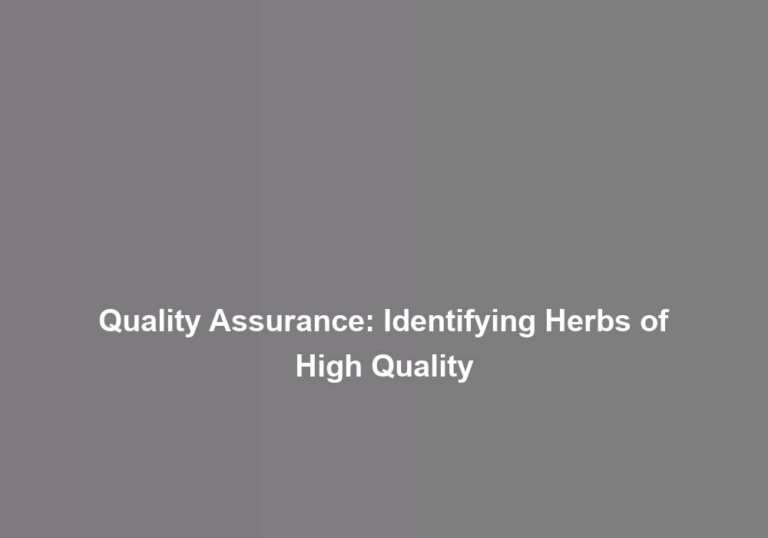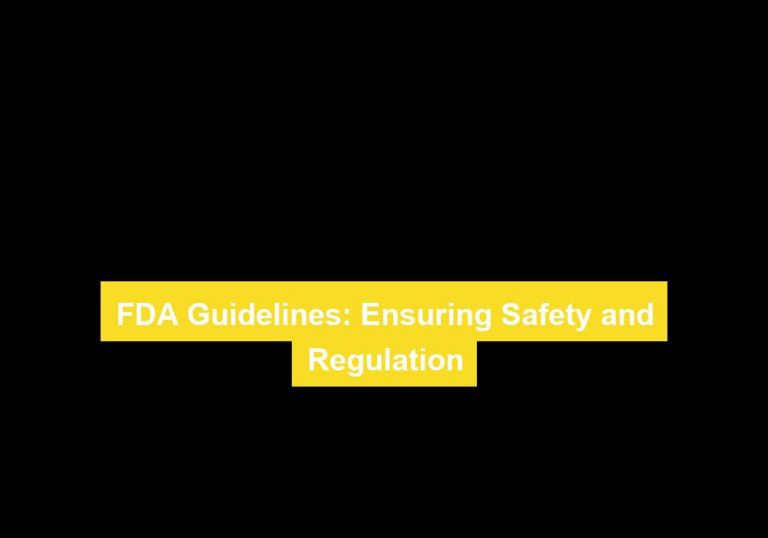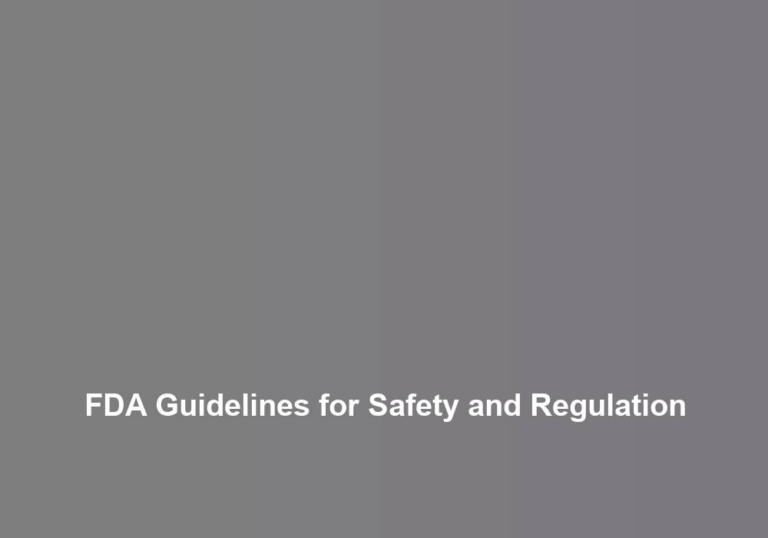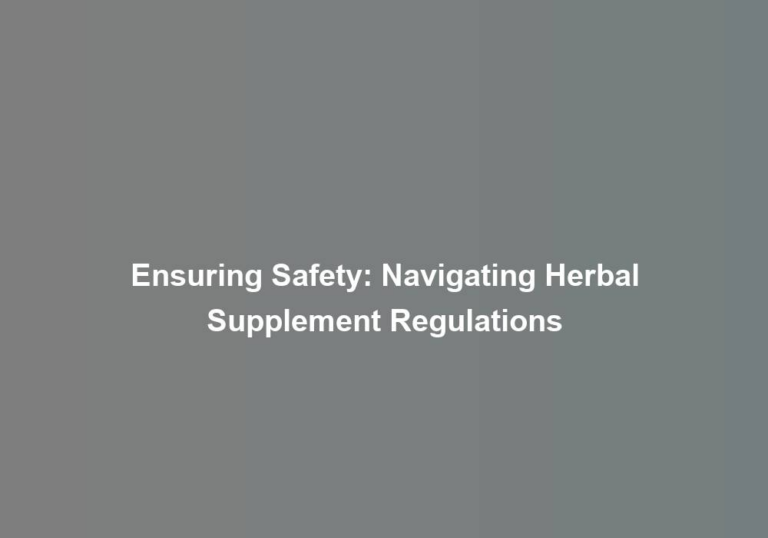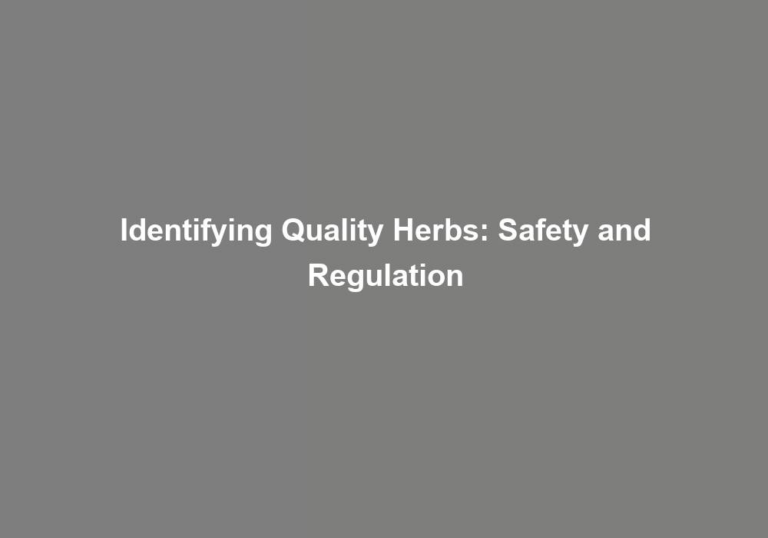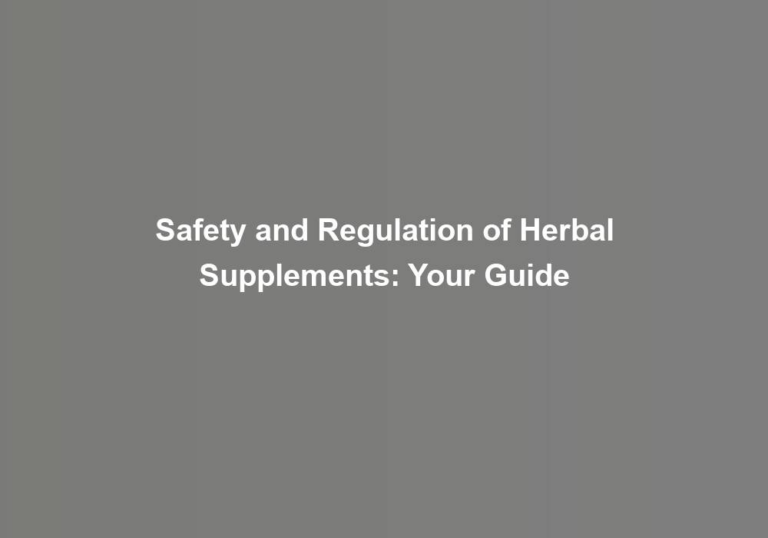Ensuring Quality Herbs: Safety and Regulatory Insights
You may think that ensuring the safety and quality of herbs is a simple matter, but the reality is far more complex and critical than you might imagine. From regulatory compliance to quality control measures, the meticulous processes involved in bringing high-quality herbs to market are paramount for consumer safety and well-being. As you navigate through the intricate web of testing and certification processes, labeling requirements, and transparency standards, youG??ll gain valuable insights into the considerations that shape the industry and impact the herbs you consume.
Importance of Regulatory Compliance
Ensuring compliance with regulations is crucial for maintaining the safety and quality of herbal products. By adhering to industry regulations and compliance standards, herbal product manufacturers can guarantee the purity and potency of their offerings. When you prioritize regulatory compliance, you demonstrate your commitment to producing herbal products that meet the highest safety and quality benchmarks. This not only builds trust with your customers but also ensures that you are contributing to the overall integrity of the herbal products industry.
Meeting compliance standards set forth by regulatory bodies is not just a legal requirement; it is a fundamental aspect of producing herbal products that consumers can rely on. By following industry regulations, you are actively participating in safeguarding the well-being of those who use your herbal products. This sense of responsibility not only sets you apart as a trustworthy brand but also fosters a sense of belonging within the larger community of herbal product manufacturers who prioritize safety and quality above all else.
Furthermore, adherence to compliance standards and industry regulations helps create a cohesive and unified approach within the herbal products market. When all manufacturers commit to upholding these standards, it elevates the entire industry, reinforcing the collective dedication to providing consumers with herbal products that are not only effective but also safe for consumption. Embracing regulatory compliance is not just a necessity; it is an opportunity to contribute to a community that values integrity and consumer well-being.
Quality Control Measures
To maintain the quality and safety of your herbal products, implementing robust quality control measures is essential. Herb authenticity is a crucial factor in ensuring that the herbs used in your products are genuine and of high quality. By conducting thorough herb authenticity tests, such as botanical and chemical analyses, you can verify the identity and quality of the herbs, providing you and your customers with confidence in the products.
Contamination detection is another vital aspect of quality control. Regular testing for contaminants such as heavy metals, pesticides, and microbial organisms helps ensure that your herbal products are free from harmful substances. This not only upholds the safety of your products but also builds trust with your customers, demonstrating your commitment to delivering clean and pure herbal goods.
Implementing these quality control measures not only safeguards the integrity of your herbal products but also aligns with regulatory standards, giving you a competitive edge in the market. By assuring the authenticity and purity of your herbs, you can differentiate your brand and attract customers who prioritize quality and safety.
Incorporating these measures into your production process not only benefits your business but also contributes to the overall well-being of your customers. With stringent quality control, you can confidently offer herbal products that meet the highest standards, fostering a sense of trust and belonging within your customer base.
Testing and Certification Processes
You can streamline the quality assurance of your herbal products by engaging in rigorous testing and certification processes. Implementing thorough testing procedures and adhering to certification standards is crucial to ensure the safety and efficacy of your herbal products. Testing procedures involve various analyses to verify the identity, purity, and potency of the herbs. These may include tests for heavy metals, pesticides, microbial contamination, and active compound concentrations. By conducting these tests, you can guarantee that your herbal products meet the highest quality standards.
Certification standards play a significant role in demonstrating the quality and safety of your herbal products to consumers. Achieving certifications from reputable organizations not only enhances the credibility of your products but also instills confidence in your customers. Certifications such as Good Manufacturing Practices (GMP) and Organic certification showcase your commitment to producing high-quality, safe herbal products. These certifications assure consumers that your products have been manufactured and handled according to stringent quality guidelines.
Engaging in comprehensive testing and obtaining relevant certifications underscores your dedication to providing trustworthy herbal products. It also distinguishes your brand in a crowded market, attracting customers who value safety and quality. By prioritizing testing and certification processes, you align yourself with industry best practices and reassure consumers that they are making a reliable choice by choosing your herbal products.
Labeling Requirements and Transparency
Adhering to stringent labeling requirements and ensuring transparency is essential for providing consumers with accurate information about the composition and usage of herbal products. When it comes to labeling transparency, it is crucial for consumers to have access to clear and comprehensive information about the herbal products they are considering. This transparency not only fosters consumer trust but also empowers individuals to make informed decisions about their health and well-being.
Labeling requirements serve as a means to communicate vital information such as the ingredients used, potential allergens, recommended dosage, and any relevant warnings or contraindications. By adhering to these requirements, herbal product manufacturers demonstrate their commitment to the safety and satisfaction of their consumers. Additionally, transparent labeling practices can help consumers understand the origins of the herbs, the processes used in their preparation, and any third-party certifications or testing that have been conducted.
Moreover, transparency in labeling builds consumer trust, which is essential for the herbal products industry. When consumers feel confident in the information provided to them, they are more likely to develop a sense of loyalty and belonging to a brand or product line. This trust is a valuable asset for herbal product manufacturers, as it can lead to repeat purchases and positive word-of-mouth recommendations within the community of herbal product enthusiasts. Therefore, maintaining transparency in labeling not only fulfills regulatory requirements but also plays a pivotal role in fostering a strong bond between consumers and herbal product providers.
Consumer Safety Considerations
How can herbal product manufacturers ensure the safety of consumers through effective labeling and product information? Consumer safety is paramount when it comes to herbal products. As a consumer, you want to feel confident in the safety and quality of the herbs you consume. To achieve this, manufacturers must prioritize product traceability and contaminant detection. By implementing robust systems for product traceability, manufacturers can track the journey of herbs from cultivation to the finished product. This not only ensures accountability but also allows for quick and targeted recalls if an issue arises. Contaminant detection is equally crucial. Manufacturers should conduct rigorous testing for contaminants such as heavy metals, pesticides, and microbial organisms to guarantee the purity of the herbs.
| Product Traceability | Contaminant Detection |
|---|---|
| Track cultivation, processing, and distribution | Rigorous testing for heavy metals, pesticides, and microbial organisms |
| Enable quick and targeted recalls if needed | Ensure the purity and safety of the herbs |
| Enhance accountability | Prioritize consumer safety |
Conclusion
So, next time you pick up a bottle of G??all-naturalG?? herbal supplements, rest assured that the regulatory and testing processes ensure their safety and quality. Because we all know that the best way to guarantee the purity of your herbs is to rely on the honesty and integrity of the supplement industry. Happy herb-ing!


